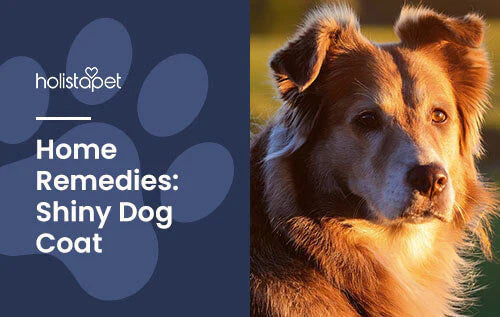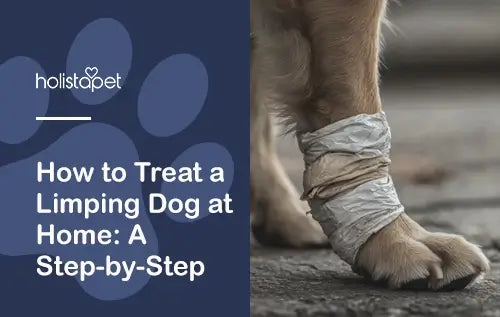Looking for home remedies for shiny dog coat? You've come to the right place! Ensuring your pup's coat shines bright not only makes them look great but also helps them stay in tip-top shape. From a healthy diet to regular grooming sessions, our tips will help keep your dog's fur shiny and their overall health thriving.
In this guide, we'll dive into easy, effective ways to maintain a glossy coat for your furry friend. Plus, we'll answer some of your most common questions about canine coat care. Let's start making your pet's coat the envy of the neighborhood!
The Importance of a Dog's Coat Health

A healthy coat acts as a barrier, protecting your canine companion from harmful environmental elements. Keeping your dog's coat healthy may help prevent issues such as dry skin, irritation, and infection.
Additionally, a healthy coat can help regulate body temperature, keeping your pup comfortable no matter the weather. Also, a shiny coat is often a sign of good health. It can indicate that your dog is receiving the right nutrition and care.
What Does a Shiny Dog Coat Mean?
As mentioned, shiny dog fur can mean your furry friend is healthy. It can indicate a high-quality diet, proper hydration, and effective grooming habits. When a dog's coat is glossy, it often means they are consuming a balanced diet rich in vital nutrients.
Plus, a vibrant coat can reflect the presence of natural oils produced by the skin. These skin oils help maintain moisture and prevent dryness. Overall, a glowing coat is a visual cue that your dog is well-cared for.
Signs of Poor Coat Health in Dogs
Recognizing the signs of poor coat condition in dogs is key for timely response. Keep an eye out for:
- Dull Coat. A lack of shine often indicates poor nutrition or an underlying health issue.
- Matted Fur. Tangles and mats can cause irritated skin and discomfort, often resulting from a lack of grooming.
- Greasy Coat. Excess oiliness can signal skin infection or hormonal imbalance.
- Hair Loss. Thinning hair or bald patches may be due to allergies, parasites, or other health conditions.
- Bald Patches. Localized hair loss often indicates infections or parasites.
- Dry Skin With Dandruff or Flakes. Flaky skin is usually a sign of poor hydration or nutritional deficiencies.
- Itching and Scratching. Dry and itchy skin leading to persistent scratching suggests skin irritation, allergies, or parasites.
- Unusual Odors. A foul smell can indicate infections or poor hygiene.
These signs can also suggest underlying health issues. If you notice any of these symptoms, consult your veterinarian.
Causes of Poor Coat Health in Dogs
When you understand what could be causing your dog's fur to lose its shine, you can take the right steps to address the problem. Here are some of the most common factors that contribute to dog coat issues:
- Allergies. Food or environmental allergies can irritate a dog's skin and lead to coat problems.
- Parasites. Fleas, ticks, and mites can cause itching, hair fall, and infections.
- Hormonal Imbalances. Conditions like hypothyroidism can affect coat quality.
- Poor Nutrition. When a dog's diet lacks essential nutrients, it can affect skin health and result in an unhealthy coat.
- Skin Infections. Bacterial or fungal infections can cause excessive shedding, itching, and odor.
- Age. Older dogs may naturally have poorer coats due to changes in their metabolism and skin condition.
- Improper Grooming. Lack of grooming can lead to matting and other coat issues.
- Environmental Factors. Harsh weather or exposure to chemicals can damage your pet's coat.
- Breed-Specific Issues. A dog's breed may give clues, too. Not all dogs are at high risk of fur troubles, but some are more susceptible due to genetics. For example, Bulldogs and Pugs often experience skin fold dermatitis, while German Shepherds often face skin allergies.
Home Remedies To Keep Your Dog's Coat Shiny and Healthy

Making your pup's coat shinier is not impossible. Some simple home remedies may do the trick. Incorporating high-quality food, natural supplements, and proper grooming into your pup's routine can make a big difference. Let's take a close look at some methods to keep your dog's coat glossy all day, every day.
A Balanced Diet
Choose dog food fortified with vital nutrients for your pet's diet. For homemade meals, incorporate ingredients rich in omega-3 fatty acids, like fish oil and flaxseed oil, to keep your dog's coat shiny. Lean proteins, such as chicken and turkey, are great, too, and support healthy hair growth. Lastly, add a variety of fruits and vegetables to your dog's food for more vitamins and minerals.
Healthy Dog Coat Supplements

Natural supplements can help address nutritional gaps in your dog's diet and improve their coat's feel and appearance. For best results, always choose supplements that are natural, well-tolerated, and specifically made for dogs.
We recommend HolistaPet's Skin, Coat, & Nail Soft Chews for Dogs. These tasty, soft-baked chews contain beneficial ingredients like fish oil rich in omega-3 fatty acids, biotin, vitamin C, and aloe vera, supporting healthy skin, coat, and nails in canines.
Proper Hydration
Water helps nourish dehydrated skin and promote healthy skin. It also supports the natural production of oils that help maintain a shiny coat. Make sure your pup has access to fresh, clean water throughout the day. Also, consider including moisture-rich foods in your dog's diet. Wet dog food or adding a little water to dry kibble can help.
Regular Dog Grooming
Grooming your dog regularly helps remove dirt, distribute natural oils, and prevent matting. Here are a few tips:
- Oatmeal Baths. An oatmeal bath can help soothe skin sensitivity and bring a natural shine to their coat.
- Coconut Oil. Applying coconut oil may nourish and moisturize your pet's skin, leading to a healthier coat.
- Regular Brushing. Brushing your dog's coat regularly helps remove loose hair, prevent tangles, and stimulate the skin.
Omega-3 Fatty Acids
Omega-3 fatty acids found in fish oil or flaxseed can do wonders for your dog’s coat and skin. Adding these healthy fats to their diet helps reduce dryness, prevent irritation, and promote a radiant, silky coat.
Apple Cider Vinegar for Shine
Apple cider vinegar is a natural remedy to restore your dog's coat shine. Dilute it with water and use it as a rinse after bathing to balance the skin's pH, fight dandruff, and leave the coat smooth and glossy.
Regular Exercise and Outdoor Time
Physical activity helps boost circulation, which then helps distribute essential nutrients to your dog's skin and coat. Exercise can also help improve your dog's mood, which affects their coat quality. Also, outdoor activities let your pup soak in some sunlight, which helps improve their coat and overall health.
Parasite Prevention
Parasites like fleas, ticks, and mites can cause coat damage and discomfort. Regularly check your pup for signs of parasites and use appropriate preventive treatments. Keeping your pet's living area clean helps prevent infestations. Also, consider using natural options, such as essential oils like lavender or eucalyptus, which can deter parasites.
Related Post: Best Home Remedies for Dog Ear Mites
Shiny Dog Coat Home Remedies - Frequently Asked Questions
This FAQ section addresses some common questions about home remedies for a dog's shiny coat. Get more insights and practical tips here. Whether you're curious about bathing routines or selecting the right supplements, we've got you covered.
How Often Should I Bathe My Dog?

Bathing frequency depends on your dog's breed, coat type, and lifestyle. Generally, most dogs require a bath every 4-6 weeks. However, dogs with oily coats or those who spend much time outdoors might need more frequent baths.
Be careful not to bathe your dog too often. Doing so can lead to dry, irritated skin, so balance is key. Consult your vet for personalized bathing recommendations if your dog has specific skin issues.
How Can I Choose the Best Skin and Coat Supplement for My Dog?
Choosing the best skin and coat supplement for your furry pal involves looking for quality ingredients and reputable brands. HolistaPet ticks these boxes. Our Skin, Coat, & Nail Soft Chews for Dogs and other products are all-natural, gluten-free, dairy-free, and non-GMO, ensuring a safe choice for your pup. All HolistaPet offerings are also third-party lab-tested and vet-approved for added peace of mind.
Can I Use Human Shampoo or Conditioner on My Dog's Coat?
Using human shampoo or conditioner on your dog's coat is not recommended. Human products have different pH levels, which can irritate your dog's skin and strip their coat of natural oils. This can result in dry, itchy skin and a dull coat.
Always use shampoos and conditioners for canines. These products meet the unique needs of a dog's skin and coat, promoting a healthy, shiny appearance without causing irritation.
When Do I Need To Visit the Vet for My Dog's Coat Care?
You should visit the vet if you notice persistent symptoms that don't improve with regular grooming and home remedies. Here are some signs:
- Continuous Hair Loss
- Bald Patches
- Excessive Itching
- Unusual Odors
- Skin Infections
- Severe Dryness
- Sudden Changes in Coat Condition
Your vet can diagnose underlying health problems and provide proper treatment. Regular checkups also help prevent any other potential issues.
Wrapping It Up - Home Remedies for Shiny Coat in Dogs
Keeping your dog's coat shiny is well within reach, thanks to simple home remedies and proper care. Ensure a balanced diet, proper hydration, and consistent grooming. Don't forget parasite prevention and quality natural supplements like ours. By following these tips and paying attention to your dog's needs, you can keep your best friend looking and feeling their best.







![Probiotics For Dogs [Soft Chews] - HolistaPet](http://www.holistapet.com/cdn/shop/files/Probiotic-Infographic-1_472d7a29-e30c-435a-9638-1365d8c3a9f9.jpg?v=1725384841&width=104)



























Leave a comment
All comments are moderated before being published.
This site is protected by hCaptcha and the hCaptcha Privacy Policy and Terms of Service apply.